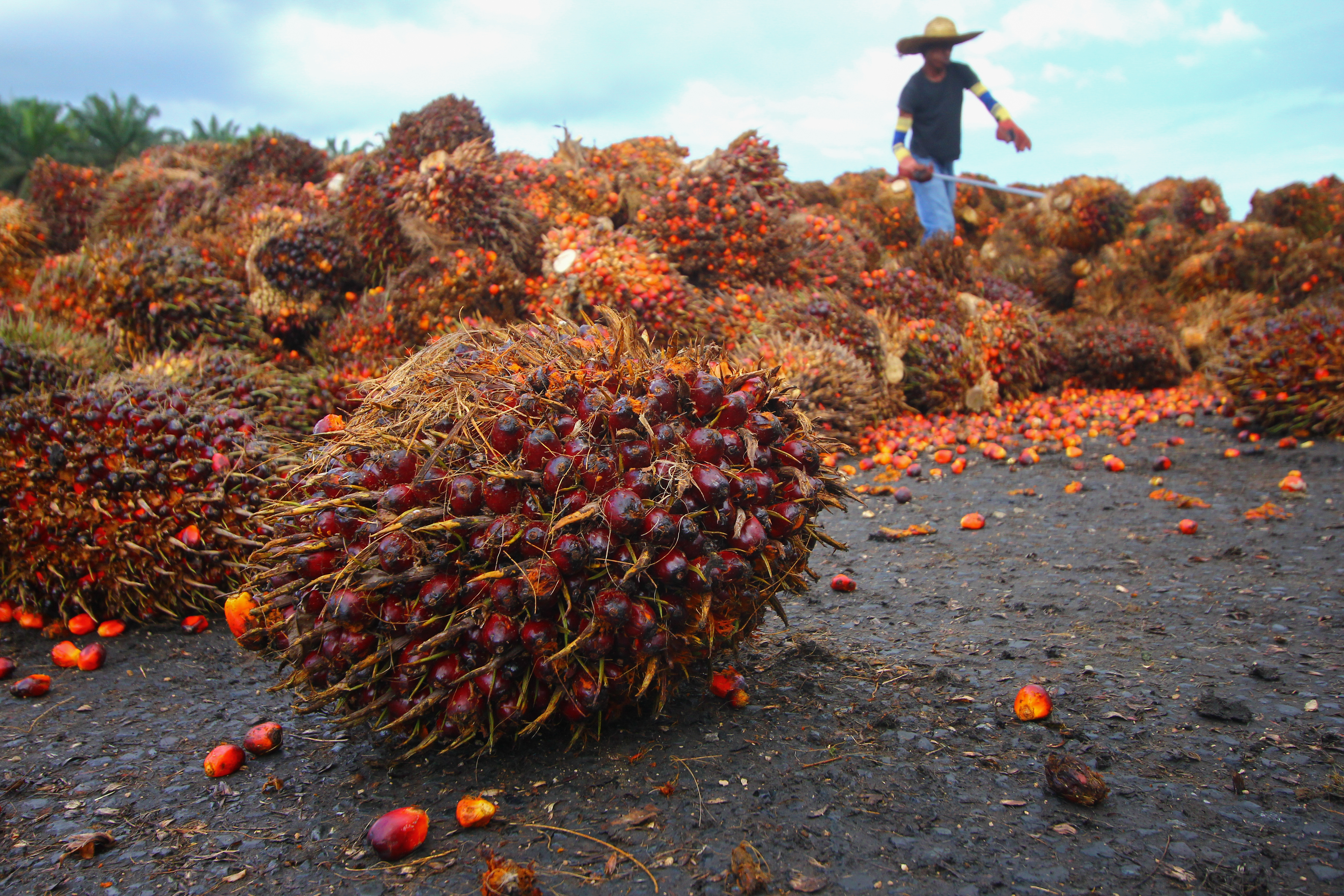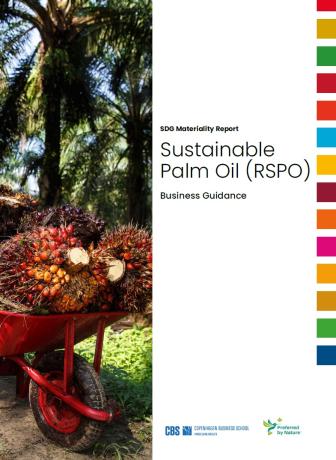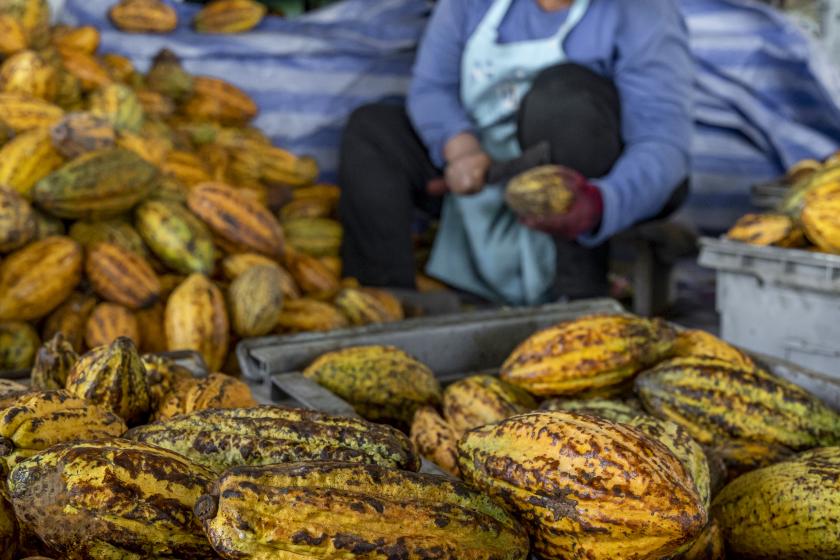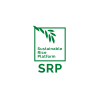Czym jest RSPO?
Roundtable on Sustainable Palm Oil (RSPO) to niezależna, non-profitowa inicjatywa zrzeszająca wielu interesariuszy, która opracowała globalne standardy odpowiedzialnej produkcji oleju palmowego.
Aby ograniczyć negatywny wpływ uprawy oleju palmowego na środowisko i społeczności lokalne, RSPO stworzyło zestaw kryteriów środowiskowych i społecznych. Firmy muszą spełniać te wymagania, aby móc produkować Certyfikowany Zrównoważony Olej Palmowy (CSPO).
Producenci oleju palmowego uzyskują certyfikat po szczegółowej weryfikacji procesu produkcyjnego, prowadzonej przez akredytowane jednostki certyfikujące, zgodnie z rygorystycznymi Zasadami i Kryteriami RSPO dotyczącymi Zrównoważonej Produkcji Oleju Palmowego. Zasady i Kryteria RSPO są opracowywane i aktualizowane co pięć lat, a sam proces ich tworzenia odbywa się zgodnie z najlepszymi praktykami określonymi przez ISEAL..
RSPO łączy różnorodnych interesariuszy z całej branży oleju palmowego i zrzesza szeroką sieć członków z krajów produkujących lub wykorzystujących olej palmowy. Są to firmy działające w całym łańcuchu dostaw oleju palmowego, które zobowiązały się do produkcji, pozyskiwania i/lub stosowania zrównoważonego oleju palmowego certyfikowanego przez RSPO.
Jako jednostka certyfikująca, Preferred by Nature wspiera firmy na drodze do uzyskania certyfikacji RSPO.
>> Dowiedz się więcej na stronie RSPO
Certyfikacja Łańcucha Dostaw RSPO
Certyfikacja RSPO potwierdza zaangażowanie Twojej organizacji w odpowiedzialne pozyskiwanie i dostarczanie oleju palmowego. Jeśli Twoja firma produkuje, handluje lub wykorzystuje odpowiedzialny olej palmowy, Certyfikacja Łańcucha Dostaw RSPO (SCC) jest dla Ciebie.
Wszystkie organizacje w łańcuchu dostaw, które korzystają z certyfikowanych produktów oleju palmowego, muszą przejść audyt. Celem tego procesu jest zapobieganie podwójnej sprzedaży oraz mieszaniu oleju certyfikowanego z konwencjonalnym (niecertyfikowanym). Firmy spełniające wymagania mogą oznaczać swoje produkty Znakiem Towarowym RSPO.
W modelu Mass Balance system dopuszcza mieszanie certyfikowanych i niecertyfikowanych produktów oleju palmowego na dowolnym etapie łańcucha dostaw, pod warunkiem że całkowite ilości są kontrolowane na danym etapie. Produkty certyfikowane, dostarczane użytkownikowi końcowemu w ramach tego modelu, można prześledzić do listy tłoczni posiadających certyfikat RSPO.
W przypadku naruszenia zasad RSPO, certyfikat może zostać cofnięty w dowolnym momencie.
>> Pobierz ulotkę informacyjną
Certyfikacja RSPO - Zasady i Kryteria (P&C)
Standard RSPO P&C z 2018 roku stanowi kompleksowe ramy zasad i kryteriów, których muszą przestrzegać producenci oleju palmowego, aby osiągnąć zrównoważony rozwój. Certyfikacja ta została opracowana w celu zapobiegania negatywnemu wpływowi produkcji oleju palmowego na środowisko i społeczeństwo, odnosząc się do kluczowych kwestii, takich jak wylesianie czy niesprawiedliwości społeczne.
Certyfikacja RSPO P&C obejmuje szeroki zakres aspektów związanych z produkcją oleju palmowego, w tym ochronę środowiska, dobrostan społeczny oraz praktyki etyczne, czyniąc z niej kluczowe narzędzie wspierające zrównoważony rozwój w branży oleju palmowego.
>> Pobierz ulotkę informacyjną
Certyfikacja Niezależnych Małych Producentów RSPO (ISH)
Standard RSPO ISH z 2019 roku został opracowany z myślą o małych, niezależnych producentach oleju palmowego, zarządzających niewielkimi plantacjami. Certyfikacja ta uznaje i wspiera ich działania na rzecz zrównoważonego rozwoju, zapewniając zgodność produkcji z rygorystycznymi standardami ochrony środowiska oraz odpowiedzialności społecznej.
Certyfikacja ta nie tylko umożliwia drobnym plantatorom dostęp do rynków wymagających zrównoważonego oleju palmowego, ale także przyczynia się do realizacji szerszego celu, jakim jest odpowiedzialna produkcja oleju palmowego oraz jej pozytywny wpływ na ludzi i planetę.
>> Pobierz ulotkę informacyjną

5 korzyści z wyboru certyfikacji RSPO
- Ochrona środowiska i społeczności lokalnych, RSPO odpowiada na obawy związane z negatywnym wpływem oleju palmowego na środowisko i społeczeństwo. Dzięki certyfikacji możesz zapewnić klientów, że Twoja firma aktywnie wspiera ochronę przyrody i dobrostan lokalnych społeczności.
Dostęp do nowych rynków i klientów. Wiodący producenci zobowiązują się do stosowania odpowiedzialnego oleju palmowego i preferują przejrzyste łańcuchy dostaw. Popyt na certyfikowany zrównoważony olej palmowy (CSPO) stale rośnie – szczególnie na rynkach takich jak Europa, które dążą do importu wyłącznie certyfikowanych produktów.
Wzmocnienie wizerunku i rozpoznawalności marki. Certyfikacja RSPO podkreśla zaangażowanie Twojej firmy w odpowiedzialną produkcję, co pomaga ograniczać negatywne postrzeganie branży i buduje zaufanie do marki.
Poprawa jakości i zarządzania. Wdrożenie certyfikacji często przynosi dodatkowe korzyści, takie jak oszczędności kosztowe, lepsze zarządzanie łańcuchem dostaw, większa przejrzystość i skuteczniejsza identyfikowalność.
- Członkostwo w organizacji tworzonej przez jej uczestników. RSPO to organizacja napędzana przez swoich członków. Regularnie publikuje raporty i analizy dotyczące wdrażania CSPO oraz zmian w świadomości i preferencjach konsumentów.
Proces certyfikacji RSPO
Rozpocznij swoją drogę do certyfikacji, wypełniając formularz zgłoszeniowy lub kontaktując się z nami bezpośrednio. Nasi eksperci pomogą Ci określić zakres certyfikacji najlepiej dopasowany do struktury i potrzeb Twojej organizacji. Poniższy proces dotyczy certyfikacji RSPO Łańcucha Dostaw (SCC), Zasad i Kryteriów (P&C) oraz Niezależnych Małych Producentów (ISH).
Krok 1: Proces aplikacyjny
Rozpocznij proces od podpisania umowy certyfikacyjnej z Preferred by Nature oraz dołączenia do RSPO jako członek.Krok 2: Przygotowanie do certyfikacji
Przygotuj organizację do spełnienia wymagań RSPO. Obejmuje to m.in. przypisanie odpowiedzialności wewnątrz firmy, opracowanie procedur łańcucha dostaw (Chain of Custody) oraz przeszkolenie personelu.Krok 3: Audyt
Audyt RSPO przeprowadzany jest na miejscu. Czas trwania zależy od wielkości, złożoności i liczby lokalizacji Twojej działalności. W trakcie audytu przeprowadzane są wywiady, przegląd dokumentacji, wizyty na plantacjach i obiektach produkcyjnych oraz weryfikacja systemu księgowania wolumenów.Krok 4: Raport z audytu
Nasi doświadczeni audytorzy RSPO SCC opracują raport z audytu, który zostanie poddany przeglądowi przez niezależnych ekspertów wewnątrz Preferred by Nature. Na tej podstawie zostanie podjęta decyzja certyfikacyjna.Krok 5: Uzyskanie certyfikatu
Po zatwierdzeniu certyfikacji, raport i projekt certyfikatu zostaną przesłane do RSPO do ostatecznej akceptacji. Po jej uzyskaniu otrzymasz certyfikat, a Twoja roczna licencja zostanie aktywowana w bazie danych RSPO.
Certyfikat RSPO jest ważny przez 5 lat, pod warunkiem pozytywnego przechodzenia corocznych audytów oraz przestrzegania wszystkich wymagań w okresie obowiązywania licencji. Po upływie ważności certyfikatu wymagany jest audyt recertyfikacyjny.
Skargi i rozwiązywanie sporów
Jeśli zgłoszona zostanie skarga dotycząca naszych usług certyfikacyjnych lub dotycząca jednego z naszych klientów, postępujemy zgodnie z naszą Polityką Rozwiązywania Sporów. W przypadku, gdy bezstronność Preferred by Nature zostanie zakwestionowana, możemy zwrócić się o wsparcie do naszego Komitetu ds. Bezstronności.
Certyfikacja Łańcucha Dostaw RSPO
Poniżej przedstawiamy kluczowe elementy, które należy wziąć pod uwagę przy określaniu zakresu certyfikatu RSPO dla łańcucha dostaw. Nasz zespół pomoże Ci dobrać odpowiedni typ i zakres certyfikacji dopasowany do Twoich potrzeb.
- Model Łańcucha Dostaw: Musisz wybrać jeden z trzech modeli łańcucha dostaw stosowanych w certyfikacji RSPO: Identity Preserved (IP), Segregation (SG) lub Mass Balance (MB). Wybór ten jest ściśle powiązany ze strukturą Twojej firmy – w tym z tym, czy będziesz mieszać surowce certyfikowane z niecertyfikowanymi. W zależności od złożoności Twojej produkcji i handlu możesz potrzebować więcej niż jednego systemu.
- System Book and Claim: Czwarty model łańcucha dostaw, Book and Claim, nie dotyczy producentów. W tym przypadku nie jest wymagana certyfikacja, jednak użytkownicy muszą przestrzegać zasad systemu RSPO Book and Claim. Ponadto wszelkie składane deklaracje muszą być zgodne z opublikowanymi zasadami RSPO dotyczącymi komunikacji rynkowej i składania roszczeń.
Jeśli Twoja organizacja zarządza obiektami w dwóch lub więcej lokalizacjach, możesz kwalifikować się do certyfikacji wielozakładowej, która pozwala obniżyć całkowity koszt certyfikacji. Rodzaje certyfikacji RSPO w łańcuchu dostaw.
- Pojedyncza (Single): Certyfikacja dotyczy jednego podmiotu zarządzającego tylko jedną lokalizacją. Certyfikat CoC (Chain of Custody) obejmuje wyłącznie ten jeden podmiot.
- Wielozakładowa (Multi-site): Opcja certyfikacji dla grupy lokalizacji powiązanych umową, posiadających zdefiniowane Biuro Centralne oraz co najmniej dwie uczestniczące jednostki.
- Grupowa (Group): Certyfikacja grupowa w łańcuchu dostaw RSPO umożliwia podział bezpośrednich kosztów certyfikacji pomiędzy kwalifikujących się członków grupy.
Certyfikacja Zasad i Kryteriów RSPO (P&C)
Standard RSPO określa ogólne wymagania dotyczące zrównoważonej produkcji oleju palmowego. Jednakże konkretne kryteria w ramach standardu Zasad i Kryteriów RSPO (P&C) mogą się różnić w zależności od rodzaju działalności prowadzonej w danym miejscu. Na przykład niektóre wymagania, takie jak długoterminowe plany zarządzania ekonomicznego i finansowego, mogą nie mieć zastosowania do drobnych plantatorów zaopatrujących tłocznie oleju palmowego.
Interpretacje Krajowe i Dokumenty Normatywne
Interpretacje Krajowe RSPO P&C oraz Interpretacje Krajowe RSPO dla Drobnych Plantatorów (ISH) stosowane są w przypadku, gdy zostały zatwierdzone przez RSPO. W sytuacjach, gdy takie interpretacje nie są zatwierdzone, do audytów stosuje się najnowszą wersję standardu RSPO P&C.
W zależności od zakresu audytu i specyfiki prowadzonej działalności, mogą mieć również zastosowanie inne dokumenty normatywne. Obejmują one między innymi: Standard Certyfikacji Łańcucha Dostaw RSPO (istotny dla operacji przetwórczych), procedurę nowych nasadzeń (NPP) oraz certyfikację grupową.
Standardy RSPO zawierają istotne, możliwe do wdrożenia wymagania, które są wspólnie omawiane i uzgadniane przez siedem kategorii członków RSPO, reprezentujących różne grupy interesariuszy.
Standardy RSPO określają cele, zadania i obowiązkowe wymagania dotyczące produkcji i zaopatrzenia w certyfikowany olej palmowy RSPO ze zrównoważonej produkcji (CSPO).
Standard RSPO musi być aktualizowany co pięć lat. Proces przeglądu obejmuje co najmniej jedną rundę publicznych konsultacji trwających minimum 60 dni. Standardy RSPO i dokumenty wspierające są opracowywane w sposób kompleksowy, oparty na konsensusie i przejrzystości, z uwzględnieniem opinii społeczeństwa i wkładu zainteresowanych stron poprzez publiczne konsultacje.
Dostęp do aktualnych standardów:
Info sheet

RSPO Supply Chain Certification Info Sheet
An infosheet covering information on the RSPO Supply Chain programme.
An infosheet covering information on the RSPO Supply Chain programme.

RSPO Principles and Criteria (P&C) & RSPO Independent Smallholder (ISH) Certifications Info Sheet
The RSPO P&C certification serves as a cornerstone for responsible palm oil production. It establishes a comprehensive framework of principles and criteria that palm oil producers...
The RSPO P&C certification serves as a cornerstone for responsible palm oil production. It establishes a comprehensive framework of principles and criteria that palm oil producers...
Procedure

Sample RSPO Supply Chain Certification Procedures
You may use this document for inspiration on how to develop and structure your own company-specific RSPO Supply Chain Certification (SCC) procedures. Please be aware that this is ...
You may use this document for inspiration on how to develop and structure your own company-specific RSPO Supply Chain Certification (SCC) procedures. Please be aware that this is ...
Report

SDG Materiality Report - Sustainable Palm Oil (RSPO)
This SDG Materiality Report represents an important tool for businesses who wish to support the sustainable palm oil transition. The Report translates the support of sustainable p...
This SDG Materiality Report represents an important tool for businesses who wish to support the sustainable palm oil transition. The Report translates the support of sustainable p...
Get in contact with us
Our experts are ready to support you on your sustainability journey.





















